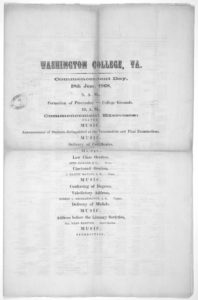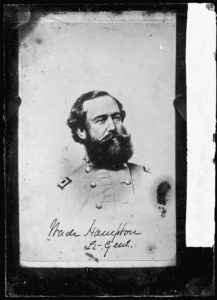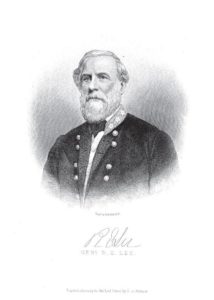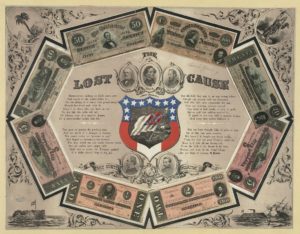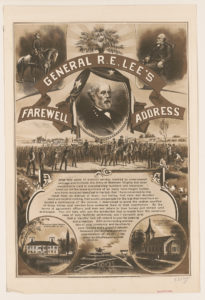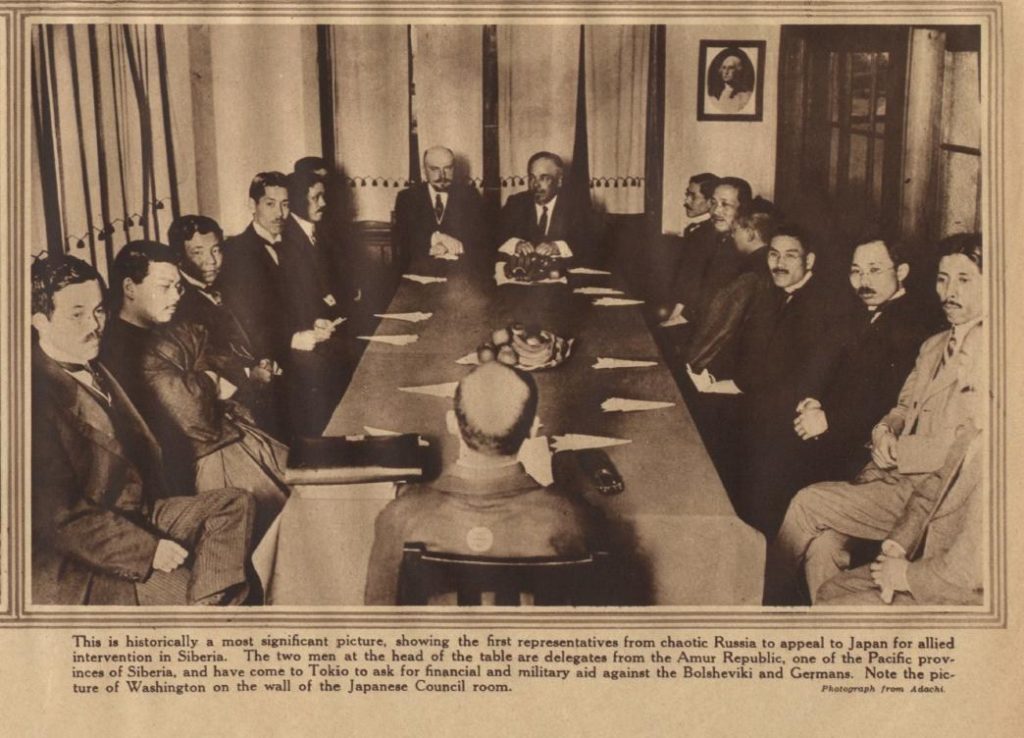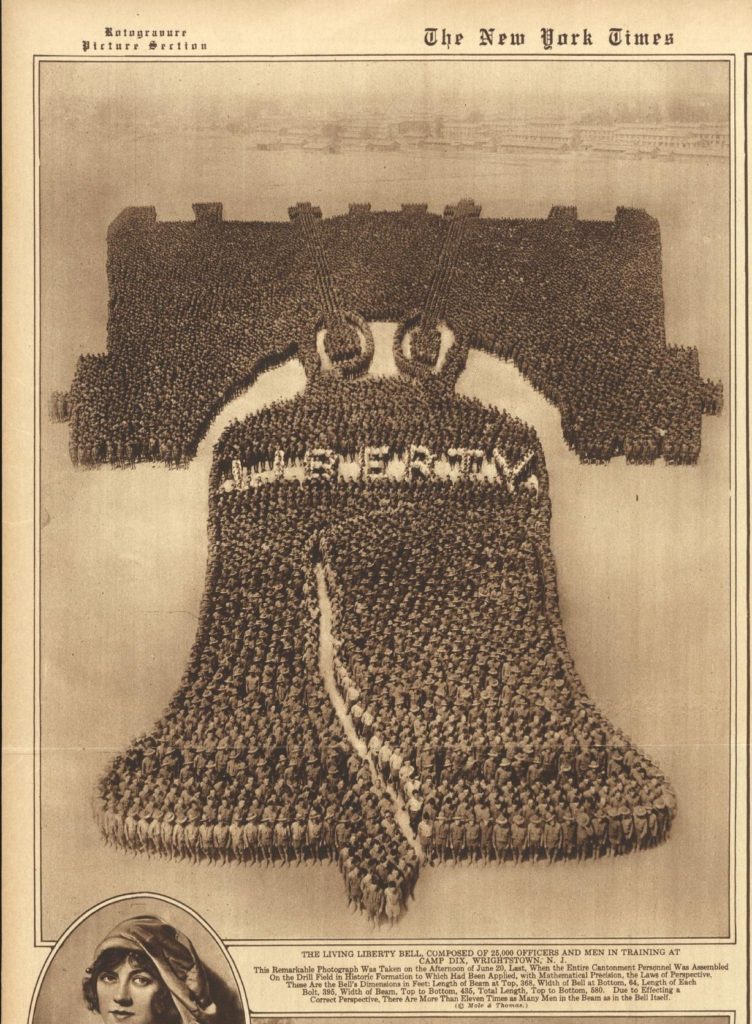According to documentation at the Library of Congress, Washington College in Lexington, Virginia held commencement exercises on June 18, 1868. A northern newspaper was disgruntled by a report from an unnamed source about some activities (toasts) during an alumni supper during commencement week and regretted having previously encouraged its readers to consider financial support for the college.
From the July 11, 1868 issue of Harper’s Weekly (at the Internet Archives Harper’s page 435):
WASHINGTON’S PRINCIPLES AT WASHINGTON COLLEGE.
SOME time since we called attention to a public meting in this city, under the auspices of the Governor and many of the most conspicuous Republican citizens, for the relief of Washington College in Virginia, of which General LEE is President. We said, “There is no subject more important, there is nothing so absolutely essential to peaceful reconstruction than general education in those States,” and we trusted “that those who wish to do what they can to heal all national wounds will give the subject a candid and thoughtful attention.” It was represented by the circular that the principles of WASHINGTON were to be inculcated in the college that bears his name, and nothing seemed to us more desirable for the youth of the Southern States.
We are now sorry to have to record that the circular did not tell the truth. The late Commencement festival at Washington College was made in part the occasion of a kind of memorial service to the “lost cause,” which was, of course, wholly a matter of taste so far as the participants were concerned. There was an alumni supper during the Commencement week, at which the fourth toast was: “The fallen heroes of the war! Noble men. The story of their martyrdom adds fresh lustre to a motto too often sneered at, Dulce et decorum est pro patria mori.” To this classic toast General WADE HAMPTON responded. He said that he did not believe they had fallen in vain – the cause for which JACKSON and STUART fell cannot be in vain, but in some form would yet triumph. The eloquent General, who had also delivered the address before the Literary Societies, evidently had his eye upon the New York Convention of the 4th of July. In closing, he proposed as a toast “The lost cause.” The reporter says: “This was drank silently and solemnly by all; and in looking around we observed that nearly all present were Confederate soldiers.”
The eighth toast at this cheerful supper was, “The true men of the South! Having courage without rashness, prudence without timidity, they neither quail before the frown of power nor fawn upon the hands that have manacled the liberties of their country.” To this toast “The man who had led the Stonewall Brigade” was summoned to respond; and that worthy, WALKER by name, said that during the war he had sought the true interest of Virginia, and that “since the surrender he had never bowed the knee to Baal.[I think]” He never meant to acknowledge higher allegiance than he owed his State. After General LEE had retired, the health of “old Marse ROBERT,” as he was called, was drunk, “and three vociferous cheers given for the loved old hero.”
These gentlemen who prefer to call a section their country, and who choose to bewail the total failure of the most causeless and cruel rebellion as a lost cause to be honored, will undoubtedly follow their fancies. But as we, persuaded by the circular and by the names of the gentlemen who called the meeting, spoke of it as one worthy the serious attention of thoughtful men, it becomes now our duty to say that the political principles of WASHINGTON are evidently despised at the College that bears his name, and that a college whose Commencement is devoted by its alumni to such a performance as this supper is a mere hot-bed of disaffection to the Union and to the principles of American Government. Moreover, every humane and charitable effort of this kind upon the part of loyal men has been received in the same way by the heroes of “the lost cause.” And these men it will be remembered, persons like WADE HAMPTON and General WALKER, are the leaders of the Democratic party in the Southern States.
In his Farewell Address George Washington warned his fellow Americans not to place section above nation; Liberty required Union – individual states should not secede.
The Lost Cause movement takes its name from Edward A. Pollard’s 1866 book by that name. You can read it at the HathiTrust. Mr. Pollard began his book by going right after the national unity George Washington promoted:
There is nothing of political philosophy more plainly taught in history than the limited value of the Federal Principle. [All prior federal governments either consolidated or disintegrated. Federalism is a temporary measure for weak and immature states.] It is not to be denied that the Federal principle is valuable in peculiar circumstances and for temporary ends. But it is essentially not permanent; and all attempts to make it so, though marked for certain periods by fictitious prosperity and sudden evidences of material activity and progress, have ultimately resulted in intestine commotions and the extinction of the form of government. What, indeed, can be more natural than that the members of a confederation, after they have advanced in political life and become mature and powerful, should desire for themselves independence and free action, and be impatient of a system founded on their early and past necessities!
_________________________________________________
Edward A. Pollard wouldn’t have liked the first president’s call for national unity, but he might have at least appreciated that George Washington didn’t make himself king … or emperor.
A couple posts here have touched on Japan’s rise. The First Japanese Embassy to the United States arrived in 1860, six years after American Commodore Matthew Perry “opened” Japan. President James Buchanan welcomed the diplomats at the White House and the Japanese apparently also visited the Washington Navy Yard. In 1868 the Meiji Restoration restored imperial rule in Japan. In 1904-1905 Japan defeated Russia in a bilateral hot war. And it looks like a hundred years ago one of the sides in the Russian Civil War sent representatives to Tokyo to ask for Japanese and Allied help in its war against the Bolsheviks and Germans. The Japanese might have had a pretty high regard for George Washington. From the June 23, 1918 issue of the New York Tribune:
_____________________________________________
It’s Independence Day in the United States: a living Liberty Bell from the July 21, 1918 issue of The New-York Times:

